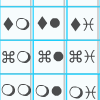Using NRICH Tasks to Develop Key Problem-Solving Skills
In her article Developing Excellence in Problem Solving with Young Learners, Jennie Pennant suggests that as teachers we can help children get better at problem solving in three main ways, one of which is through 'explicitly and repeatedly providing children with opportunities to develop key problem-solving skills'.
This article builds on Jennie's. In particular, it explains what we mean by 'problem-solving skills' and aims to give further guidance on how we can help learners to develop these skills by highlighting relevant NRICH tasks.
What do we mean by 'problem-solving skills'?
In the aforementioned article, Jennie outlines four stages of the problem-solving process:
Stage 2: Working on the problem
Stage 3: Digging deeper
Stage 4: Reflecting
By explicitly drawing children's attention to these four stages, and by spending time on them in turn, we can help children become more confident problem solvers. Jennie outlines different ways in which learners might get started on a task (stage 1), but it is once they have got going and are working on the problem (stage 2) that children will be making use of their problem-solving skills.
Here are some useful problem-solving skills:
- Trial and improvement
- Working systematically (and remember there will be more that one way of doing this: not just the one that is obvious to you!)
- Pattern spotting
- Working backwards
- Reasoning logically
- Visualising
- Conjecturing
The first two in this list are perhaps particularly helpful. As learners progress towards a solution, they may take the mathematics further (stage 3) and two more problem-solving skills become important:
- Generalising
- Proving
Having reached a solution, stage 4 of the process then involves children explaining their findings and reflecting on different methods used.
For the purposes of this article, we will think of 'problem-solving skills' as those skills that learners need in order to work on the mathematics of a task, during stages 2 and 3 of the problem-solving process.
How can we help children get better at these problem-solving skills?
In order for learners to develop their problem-solving skills, they will need to experience lots of contexts in which to practise each one and to be given lots of opportunities to talk about each one. Having a skills-based focus to a lesson or series of lessons can work well and it would be worth focusing on one or two skills at a time.
This takes us back to the Developing Excellence in Problem Solving with Young Learners article, where Jennie also suggests that our choice of task can affect learners' confidence and competence as problem solvers. So, I shall now take each problem-solving skill in turn and suggest groups of NRICH tasks which might help develop it.
Trial and improvement

Trial and improvement is perhaps an undervalued skill. Children can be reluctant to use trial and improvement as they sometimes feel they are only using it because they do not know the 'right' way to solve the problem in hand. In reality, trial and improvement involves trying something out, which will always give more insight into the context and therefore gives the solver a better idea of what to try next. Trial and improvement is often the start of working systematically.
There are two collections of NRICH tasks which are good starting points if you wish to focus on this skill:
Trial and Improvement at KS1
Trial and Improvement at KS2
Working systematically

In the context of problem solving, working systematically could be thought of as working in a methodical and efficient way which could clearly show others that a pattern or system is being used. This is important, for example, when a task entails finding all possibilities, or when it is helpful to structure a method for solving a problem. More details about what it means to work systematically can be found in the article Encouraging Primary Children to Work Systematically, which was part of our Working Systematically Feature.
We have gathered together a collection of tasks and further guidance which lend themselves to systematic working.
Pattern spotting

During the problem-solving process, being able to identify patterns can save time. However it is by then asking why the pattern occurs, and by trying to answer this question, that learners gain greater insight into mathematical structures and therefore deepen their conceptual understanding. Our Number Patterns Feature brings together a range of activities which offer children the chance to create, look for and explain patterns in the context of number.
Working backwards

Starting from the end might sound counterintuitive, but it can be an efficient way of solving a problem. We have published two groups of tasks which learners could have a go at in order to get more experience of this skill:
Working Backwards at KS1
Working Backwards at KS2
Logical reasoning

At NRICH we believe that reasoning is fundamental to knowing and doing mathematics. Our Reasoning Feature includes an article, Reasoning: Identifying Opportunities which explores when reasoning is necessary and what we do when we reason. Reasoning logically as a problem-solving skill is, however, just a small part of reasoning and involves connecting information together in a sequence of steps.
In addition to the Reasoning Feature, there are two collections of activities on the site which focus specifically on logical reasoning:
Reasoning and Convincing at KS1
Reasoning and Convincing at KS2
Visualising

Picturing what is happening in your mind's eye, or imagining what is happening or what might happen, is a skill which is perhaps not talked about very much in the classroom. Specifically drawing attention to instances when it might be used will raise learners' awareness of this skill so that they might choose to use it themselves. The tasks in the two groups below have been selected specifically because they require visualisation, so would be good contexts in which to begin to discuss this skill:
Visualising at KS1
Visualising at KS2
Conjecturing, generalising and proving

Conjecturing, or asking "What if..?" questions, is an important problem-solving skill. Knowing what to ask means that you understand something about the structure of the problem, and being able to see similarities and differences means you are starting to generalise. Caleb Gattegno once said, "If it's not shot through with infinity it's not mathematics". In other words, there must be generality for it to be mathematics.
These two collections of activities encourage children to conjecture and generalise, and in some cases, go on to prove:
Conjecturing and Generalising at KS1
Conjecturing and Generalising at KS2
In summary
One of the main ways to help children become confident and competent problem solvers is by offering them plenty of opportunities to practise key problem-solving skills and, importantly, to talk about the skills in context. In this article, I have outlined what we mean by these skills and suggested groups of NRICH tasks which focus on each. Once learners have had experience of these different problem-solving skills, they may like to tackle some of the following activities which each draws upon a range of skills:
Noah
Pairs of Numbers
Poly Plug Rectangles
Play to 37
Bracelets
Planning a School Trip
Dice in a Corner
Here is a PDF version of this article.
